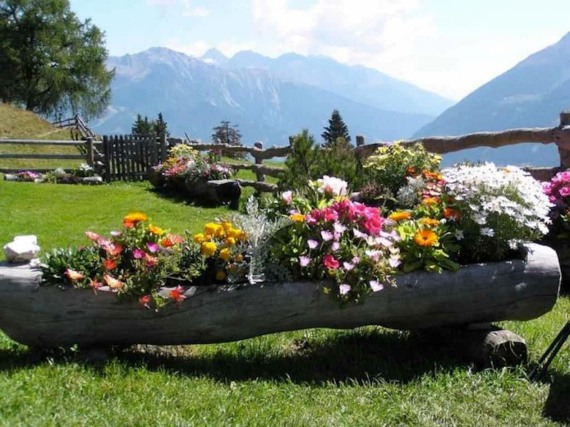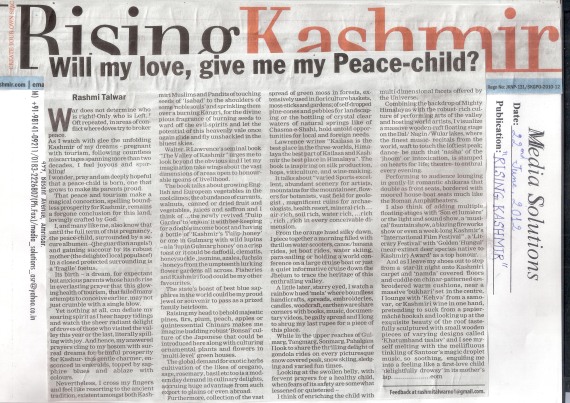Will my love, give me my Peace-child?………. By Rashmi Talwar
War does not determine who is Right !- Only who is Left..! Oft repeated, in areas of conflict where doves try to broker peace.
As I watch with glee the unfolding Kashmir of my dreams – pregnant with tourism, following countless miscarriages spanning more than two decades, I feel joyous and sparkling!
I wonder, pray and am deeply hopeful that a peace- child is born, one that grows to make its parents proud.
That peace and tourism make a magical concoction, spelling boundless prosperity for Kashmir, remains a forgone conclusion for this land, lovingly crafted by God .
I, and many like me, also know that until the full term of this pregnancy, the peace-child, surrounded by a secure albumen –( the guardian angels!) and gaining succor by its robust mother (the delighted local populace!) in a closed protected surrounding is a ‘fragile’ foetus.
Its birth – a dream, for expectant but anxious parents whose hands rise in everlasting prayer that this glowing health of tourism, that failed many attempts to conceive earlier, may not just crumble with a single blow.
Yet nothing at all, can deflate my soaring spirit as I hear happy tidings and watch the sheer radiant delight of droves of those who visited the valley this year or the last, literally spilling with joy. And hence, my answered prayers cling to my bosom with surreal dreams for brimful prosperity for Kashur– this gentle charmer, ensconced in emeralds, topped by sapphire blues and ablaze with colors.
Nevertheless, I cross my fingers and feel like resorting to the ancient tradition, existent amongst both Kashmiri Muslims and Pundits of touching seeds of ‘Isabad’ to the shoulders of some ‘noble souls’ and sprinkling them over a burning Kangri, for the divine pious fragrance of burning seeds to ward off the evil-spirits and let the potential of this heavenly vale once again glide and fly unshackled in the bluest skies.
Walter. R Lawrence’s seminal book “The Valley of Kashmir” urges me to look beyond the obvious and I let my imagination take wings about the vast dimensions of areas open to honourable means of livelihood.
The book talks about growing English and European vegetables in the cool climes; the abundance of currants, walnuts, canned or dried fruit and vegetables, juices and saffron and I think of …the newly revived ‘Tulip Garden’ to ‘enjoin’ it with bee-keeping for a double income boost and having a bottle of ‘Kashmir’s Tulip honey’ or one in Gulmarg with wild lupins – a la ‘lupin Gulmarg honey’ on a crisp toast or it could be daffodil, clematis, honeysuckle , jasmine, azalea, fuchsia – honeys from the umpteenth lurking flower gardens all across. Fisheries and Kashmiri food could be my other favorites.
The state’s boast of best blue sapphires in the world could be my proud jewel or souvenir to pass as a prized family heirloom.
Raising my head to behold majestic pines, firs, plum, peach, apples or quintessential Chinars makes me imagine budding robust ‘Bonsai’ culture of the Japanese that could be introduced here along with culturing ornamental plants and flowers in ‘multi-level’ green houses.
The global demand for exotic herbs cultivation of the likes of oregano, sage, rosemary, basil etc too is a modern day demand in culinary delights, accruing huge advantage from such export to plains or even abroad.
Furthermore, collection of the vast spread of green moss in forests, extensively used in floriculture baskets, moss-sticks and gardens; of self-dropped pine-cones and pebbles for landscaping or the bottling of crystal clear waters of natural springs like of Chashma-e-Shahi, hold untold opportunities for local and foreign needs.
Lawrence writes “Kailasa is the best place in the three-worlds, Himalaya the best part of Kailasa and Kashmir the best place in Himalaya”. The book is inspiring on silk production, hops, viticulture, and wine-making.
It talks about “varied Sports-excellent, abundant scenery for artists, mountains for the mountaineer, flowers for botanists, vast field for geologist , magnificent ruins for archaeologists, health resort, mineral-rich….air- rich, soil rich, water rich, …rich , rich , rich in every conceivable dimension.
From the orange hued silky dawn, I piece together a morning filled with thrill on water-scooters, canoe/banana rides, jet boat rides, water skiing, para-sailing or holding a world conference on a large cruise boat or just a quiet informative cruise down the Jhelum to trace the heritage of this enthralling valley.
A little later, starry eyed, I watch a rainbow hued ‘mela’ where boundless handicrafts, spreads, embroideries, candles, woodcraft, earthenware share corners with books, music, documentary videos, be gaily spread and I long to shrug my last rupee for a piece of this place.
While in the upper reaches of Gulmarg, Tangmarg, Sonmarg , Pahalgam I look to share the thrilling delight of gondola rides on every picturesque snow covered peak, snow skiing, sledging and varied fun times.
Looking at the swollen belly, with fervent prayers for a healthy child, when fears of its safety are somewhat lessened or quietened —
I think of enriching the child with multi-dimensional facets offered by the Universe.
Combining the backdrop of Mighty Himalayas with the robust- rich culture of performing arts of the valley and hosting world artists, I visualize a massive wooden-raft floating stage on the Dal/ Nagin /Wular lakes, where the finest music- recitals from the world, waft to touch the loftiest peak; dance- be such that ‘nasha’ of the ‘jhoom’ or intoxication, is stamped on hearts for life; theatre- to enthrall every evening.
Performing to audience lounging in gently-lit romantic shikaras that double as front seats, bordered with moored house-boat seats much like the Roman Amphitheaters.
I also think of adding multiple floating-stages with ‘Son et lumière’ or the light and sound show, a ‘musical’ fountain show, a blazing fireworks show or even a week-long Kashmir’s “International Film Festival” , a ‘Literary Festival’ with ‘Golden ‘Hungul’(near-extinct deer species native to Kashmir) Award’ as a top honour.
And as I leave my shoes out to step from a star-lit night onto Kashmiri carpet and ‘namda’ covered floors and cuddle on chinar-patterned embroidered warm cushions, near a massive ‘bukhari’ set in the centre, I lounge with ‘Kehva’ from a samovar, or Kashmiri wine in one hand, pretending to suck from a papier`-mache hookah and looking up at the exquisite beauty of the roof tastefully sculptured with small wooden pieces of varying designs called ‘Khaatumband taalav’ and I see myself melting with the mellifluous tinkling of Santoor’s magic droplet music, so soothing, engulfing me into a feeling like a first-love child ‘delightfully drowsy’ in its mother’s lap.
FIRST PUBLISHED ON OPINION PAGE 7 IN “RISING KASHMIR” ON JUNE 22, 2012














Recent Comments